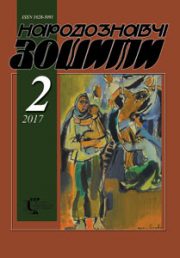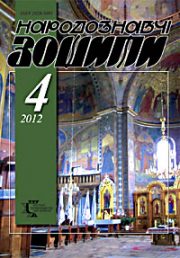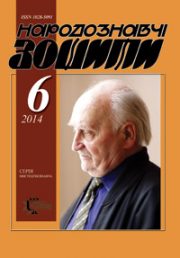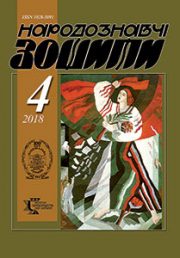The Ethnology Notebooks. 2024. № 5 (179), 1096—1108
UDK [39:140.8:27-14](=161.2):81’373.7’373.42-022.215
DOI https://doi.org/10.15407/nz2024.05.1096
CONCEPTIONS OF GOD AS CREATOR AND SUSTAINER IN THE FOLK WORLDVIEW OF UKRAINIANS: BASED ON PAREMIAS
TARASYUK Iryna
- ORCID ID: https://orcid.org/0000-0002-9994-1876
- Researcher at the Institute of Ethnology
- of the National Academy of Sciences of Ukraine,
- Department of Ethnology,
- 15, Svobody Avenue, 79000, Lviv, Ukraine,
- e-mail: tarasyuk007@gmail.com
Abstract. This article explores the folk understanding of God as Creator and Sustainer through the analysis of Ukrainian proverbial material, comparing it with Polish and Russian examples. The relevance of this article stems from the need for a deeper and more comprehensive scientific understanding of the spiritual world of past generations of Ukrainians, as well as revealing certain differences in the religious views or sentiments of the three nations.
The object of the study is the folk religious conceptions of God, reflected in a series of proverbs and sayings formed from the centuries-old life experience of Ukrainians and Christian teachings. The subject pertains to the characteristics of folk theology as an expression of the psychology and philosophy of life of the ethnic group, along with its worldview. The aim of our research is to describe and analyze the folk interpretation of the religious concepts of God the Creator and Sustainer through a thematic group of paremias that reflect the concentrated worldview of the ethnic group, its moral and ethical foundations, and the spiritual values of the people. The article attempts to illuminate the profound meaning of these two concepts as components of folk religious spirituality and the peculiarities of the thinking of a believing individual.
In this presentation, we aim to showcase the folk «philosophy of God» as captured in the proverbial creativity of Ukrainians, representing an internal, introverted aspect of folk religiosity. The methodological foundation of the article includes comparative-historical, typological, and semantic research methods. It is argued that the content of a significant portion of the analyzed thematic group of paremias asserts the greatness of God, conveys wonder at divine providence, and expresses admiration for the Creator. The study of this issue will deepen the awareness within Ukrainian scientific thought of the characteristics of the millennia-old Christian tradition in the spiritual culture of Ukrainians, particularly in oral literature as a verbal form of folk piety.
Keywords: folk worldview, religious conceptions, life philosophy, tradition, Christian teachings, God, Creator, Sustainer, paremia, proverb, saying.
Received 16.10.2024
REFERENCES
- Hilarion, Metropolitan. (1992). Pre-Christian Beliefs of the Ukrainian People: A Historical-Religious Monograph. Kyiv: Oberehy [in Ukrainian].
- Makarchuk, S. (2003). Christian Values of the Ukrainian Folk Culture in Historical Times and Today. The Ethnology notebooks, 1—2, 77—82 [in Ukrainian].
- Nomys, M. (Ed). (2004). Ukrainian proverbs, sayings and many others. Kyiv: Lybid’ [in Ukrainian].
- Sheveliov, Y. (1985). Nomys — Dal’ — Adal’berg. On the Problems of Ukrainian Paremiology in the Mid-19th Century. In: Collection of folklore by Matviy Nomys. In Commemoration of the 120 th Anniversary of the First Edition, 1864—1984 (Pp. 41—59). South-Bound-Brook, N.J., USA: The Publishing Fund of His Beatitude Metropolitan Mstyslav; Primate of the Ukrainian Autocephalous Orthodox Church in the Diaspora [in Ukrainian].
- Adalberg, S. (Ed). (1889—1894). Book of Polish Proverbs, Parables, and Proverbial Expressions. Collected and edited by Samuel Adalberg (Vol. 1: A—J). Warsaw [in Polish].
- Dal’, V. (Ed). (1957). Proverbs of the Russian People. Collection by V. Dal’. Moscow [in Russian].
- Rakovskij, I. (Ed). (1930). Ukrainian General Encyclopedia. Book of Knowledge: 3 vol. (Vol. 1.). Lviv [in Ukrainian].
- Zgharskij, Ev. (1873). Folk Russian Philosophy through Proverbs and Parables written by Evgeny Ya. Zgarskiy. Kolomyia [in Russian].
- Franko, I. (Ed). (1901—1910). Galician-Ruthenian folk parables. Collected, compiled and explained by I. Franko: 3 vol. Ethnographic collection. Lviv [in Ukrainian].
- Heryliuk-Kupchynskyj, P. (1996). I Believe in God: Sermons. Lviv: Missioner [in Ukrainian].
- Liubachivs’kyj, M.I. (1991). Believe in One God: Sermons and Meditations. 2nd ed. Reprint of the 1990 edition. Lviv: UCU [in Ukrainian].
- (2004). Book of Polish Proverbs. Warsaw [in Ukrainian].
- Katriy, Yu.Ya. (1981). Lord, Teach Us to Pray! New York; Toronto: Publishing House of the Basilian Fathers [in Ukrainian].
- Shashkevych, M. (1846). Psalms of Ruslan. A Wreath for the Rusyns at Harvest Time (Part 1, pp. 61—67). Vienna [in Ukrainian].
- (1991, april, 2). Word of His Beatitude Myroslav Ivan, delivered before the opera theater in Lviv. Za Vil’nu Ukrainu, 2 [in Ukrainian].
- Stepovyk, D. (1991б december 26). Christianity and Culture. Literaturna Ukraina, 3 [in Ukrainian].
- Lepkyi, B. (1991). Mazepa: A Trilogy. Motrya: A Tale. Dzvin, 2, 25—91 [in Ukrainian].
- Bilonozhenko, V.M. (Ed.). (1999). Phraseological Dictionary of the Ukrainian Language (Book 1). Kyiv: Naukova dumka [in Ukrainian].
- Plawiuk, V. (Ed). (1998). Proverbs or Ukrainian popular philosophy (Vol. 1). Edmonton: Ukrainian Pioneers Association of Alberta, Canada [in Ukrainian].
- Plawiuk, V. (Ed). (1996). Ukrainian Proverbs (Vol. 2). Edmonton: The Huculak Chair of Ukrainian Culture and Ethnography, University of Alberta; Ukrainian Pioneers Association of Alberta, Canada [in Ukrainian].
- Samchuk, O.V. (1991). Volhynia. Where the River Flows. Dzvin, 5, 6 [in Ukrainian].
- Katriy, Yu. (1998). Pearls of the Eastern Fathers (2nd ed., revised). Lviv: Missioner [in Ukrainian].
- Barka, V. (1998). Rider of the Sky. Lviv: Svychado [in Ukrainian].
- (2004). Polish Proverbs. Wroclaw [in Polish].
- Ivashchenko, P.S. (1875). Religious Cult of the Southern Russian People in its Proverbs. Notes of the Southwestern Division of the Imperial Russian Geographical Society (Vol. 2). Kyiv [in Russian].
- Klymyshyn, I.A., & Klymyshyn, O.I. (2001). Understanding the World and Oneself in It (for those who contemplate the place of religion in their worldview). Ivano-Frankivsk: Hostynets [in Ukrainian].
- Seniv, M. (Ed). (1997). Foundations of Christian Faith: for Youth and Adults. Drohobych: Vidrodzhennya [in Ukrainian].
- (1998). Christian Ethics: Methodological Guide (2nd ed., revised). Lviv: Svychado [in Ukrainian].
- Yaniv, V. (1966). Religiousness of the Ukrainian from an Ethnopsychological Perspective. Notes of the NTSh. Religion in the Life of the Ukrainian People (Vol. 181, pp. 179—203). Munich; Rome; Paris [in Ukrainian].
- Onatskyi, Ye. (1992). Ukrainian Emotionality. The Ukrainian Soul (Pp. 36—47). Kyiv: Phoenix [in Ukrainian].
- Olijnyk, T.P. (1994). Power of Baptism. The principles of spiritual life. Pustomyty: Publisher Basilian Fathers [in Ukrainian].
- Samchuk, U., & Pinchuk, S. (1991). Maria. Chronicle of One Life: A Novel. Kyiv: Soviet Writer [in Ukrainian].
- Kulish, P. (1989). On the Relationship of Little Russian Literature to General Russian Literature. In: P. Kulish. Works: 2 vols (Vol. 2, pp. 458—477). Kyiv: Dnipro [in Russian].
- Yarema, Ya. (1938). Ukrainian Spirituality in its Cultural and Historical Manifestations. Lviv: Ridna Shkola [in Ukrainian].
- Skovoroda, H.S. (1983). Friendly Conversation about the Soul’s World. In: H. Skovoroda. Poems. Songs. Fables. Treatises. Parables. Prose Translations. Letters (Pp. 204—211). Kyiv: Naukova dumka [in Russian].







